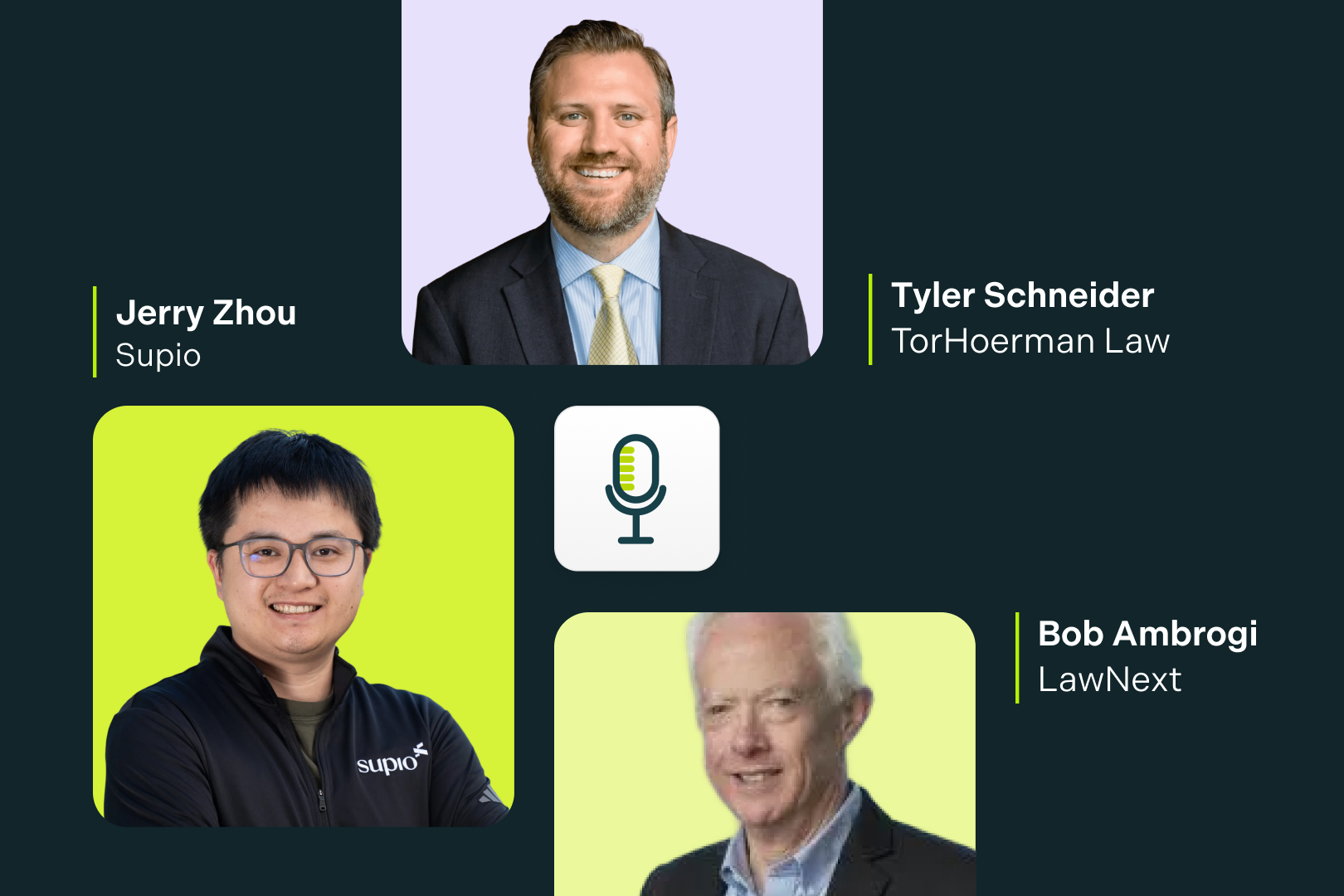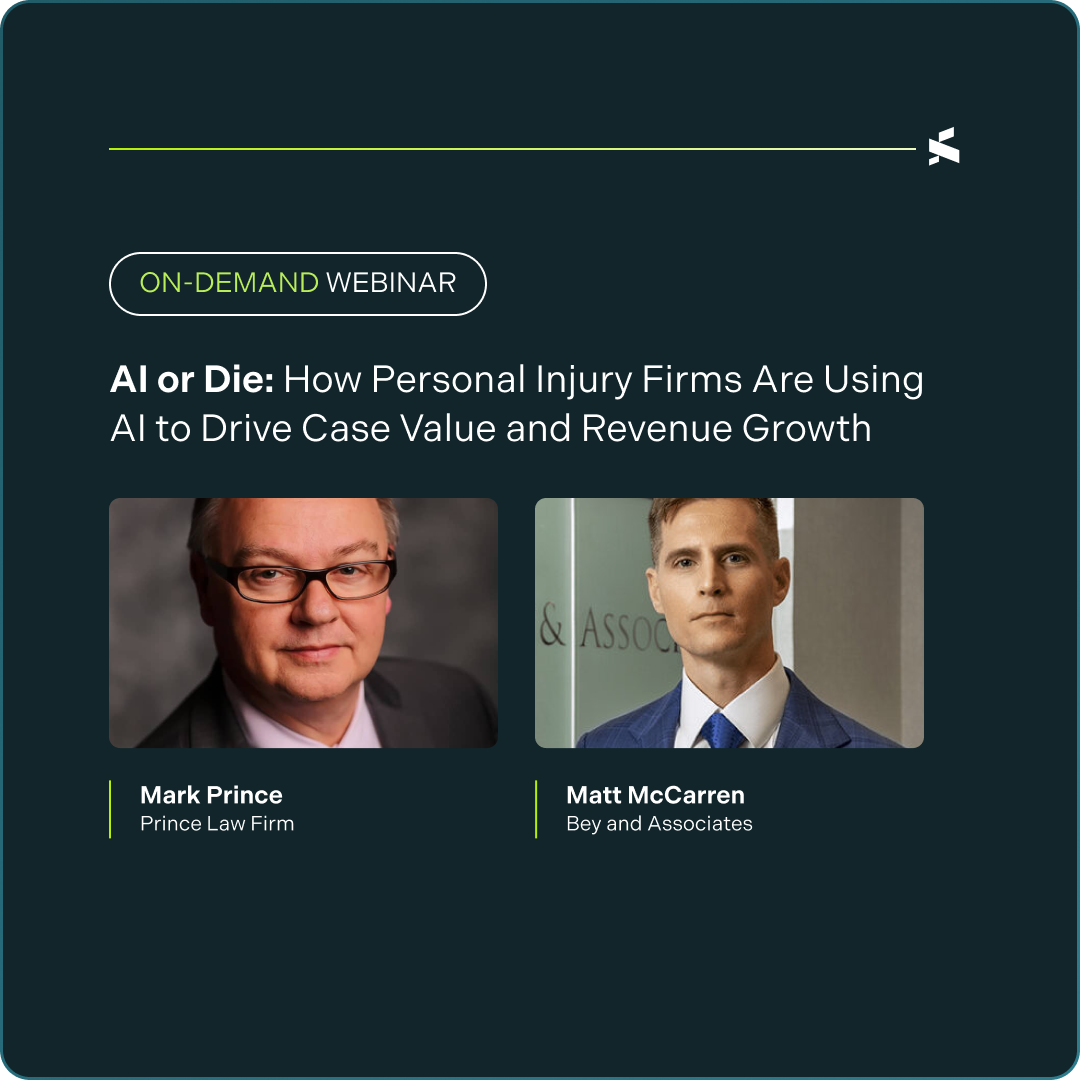This is a lightly edited and distilled version of a full podcast interview originally aired on LawNext, featuring Supio CEO Jerry Zhou and trial attorney Tyler Schneider.
Bob Ambrogi (LawNext): Jerry, let’s start with the founding story. What led you to create Supio, and why focus on personal injury law specifically?
Jerry Zhou (Supio): Supio started during COVID. My cofounder and I literally sat in a Starbucks and wrote down all the problems that annoyed us. Being first-generation immigrants, we had to help our families interface with the legal system, and it was a terrible experience. That sparked the idea: could we improve legal workflows with better tech? As we explored different areas, we realized law isn’t just one vertical—it’s a huge, fragmented industry.
I gave a talk about document automation in Florida, and it turned out most of the audience were plaintiff-side personal injury lawyers. They were incredibly engaged, and that was our "aha" moment. Personal injury is high-impact, high-volume, and very outcome-driven, which made it an ideal place to start.
Bob Ambrogi: Tyler, tell us a bit about your firm and what initially drew you to Supio.
Tyler Schneider (TorHoerman Law): I’m managing partner at TorHoerman Law. We focus on injury law—mass torts, class actions, car accidents, negligent security, the whole spectrum.
I met Jerry at a conference through a mutual friend. At the time, AI was exploding, but it also felt diluted. We knew that if we didn’t get ahead of it, we’d fall behind. Six months could mean being years behind in this landscape.
Jerry’s concept was easy to grasp: use AI to distill massive, complex cases into the data points we’re already looking for manually. It wasn’t about replacing our work—it was about doing it better and faster, and being less reactive.
Bob Ambrogi: You mentioned that personal injury law has historically lagged in adopting tech. Did you see that gap firsthand?
Tyler Schneider: Definitely. This is an archaic industry in many ways. I know great trial lawyers who still dictate everything and save files to their desktop. That worked for a while, but in mass torts and high-volume litigation, you have to separate the "lawyering" from the operational processes.
We began dabbling in AI for client communications—tools like SimplyConvert helped us triage leads. But Supio let us go deeper. We weren’t just reacting anymore. We were prioritizing cases earlier, analyzing medical history faster, and preparing more thoroughly for trial.
Bob Ambrogi: Jerry, can you explain what Supio actually does for PI firms?
Jerry Zhou: At its core, Supio helps answer any question about a case. That means unlocking information buried in documents—especially medical records, which can be 70-80% of the data in PI cases.
We use AI to structure that information into knowledge graphs. That allows us to surface insights, identify patterns, and retrieve data as reliably as a human—sometimes better, especially at scale.
For instance, we can extract all mentions of cardiology in a 40,000-page file, isolate a single doctor’s notes, or analyze patterns in depositions. It’s about increasing the fidelity and depth of insight in a repeatable way.
Tyler Schneider: Let me make that real. We had a trial involving a child with over 43,000 pages of medical records. Normally, we’d have a nurse consultant review them, maybe distill it to 4,300 pages. That still takes weeks and is super expensive.
With Supio, we uploaded the full record and segmented it by doctor, body system, treatment type—anything. I could instantly pull every cardiology-related note, every therapy session, every height and weight measurement.
That’s a game-changer. Instead of saying, "we'll do this later if we have time," we could explore every angle. We built narratives, preempted the defense’s arguments, and did it all in real-time.
Bob Ambrogi: So it’s not just about saving time. It also gives you a strategic edge?
Tyler Schneider: Absolutely. It changes how you think. I used to keep a running list of ideas to go back and check later. Now I check them immediately. If I want to analyze feeding logs or physical therapy notes, I’m not cutting corners.
The speed lets us be more creative. We're not just reacting to the other side’s arguments. We're building proactive, nuanced positions because we can access the data faster.
Bob Ambrogi: Jerry, as you worked with lawyers like Tyler, how did their feedback shape the product?
Jerry Zhou: It’s the only way to build this product. Tyler and others at the top of their craft push us to evolve.
For example, we initially built generative AI tools for answering questions. But quickly, lawyers began forming complex prompts—"Was there a standard of care violation in this nursing home case?" Then they wanted to draft documents based on that. That’s how we built chain-of-thought reasoning into the platform.
Supio has to feel like a thinking partner, not just a search engine. Every few days, Tyler sends feedback, and we iterate. That feedback loop is everything.
Bob Ambrogi: Tyler, was there internal skepticism about using AI at your firm?
Tyler Schneider: All the time. And rightly so. You still have to be a lawyer.
We coach our team to use AI as a starting point. Use it to draft an outline, find data, or break writer’s block. But always fact-check. If it gives you 86 data points, verify them. That’s where skepticism is healthy—it stops people from blindly trusting.
It’s a tool, not a replacement. And yeah, you can spot a ChatGPT email a mile away now—bullet points, bolded phrases, m-dashes. We push people to polish and refine.
Bob Ambrogi: How else are you incorporating Supio more broadly into your workflow?
Tyler Schneider: After that infant case, we started expanding its use. In our upcoming Abbott Labs and environmental exposure cases, we’re using Supio to analyze corporate witness depositions—looking for contradictions, changes, and patterns across hundreds of hours of testimony.
We also use it to break down affirmative defenses. If a defendant claims preemption or comparative fault, we ask Supio to surface the records or testimony that challenge those claims. That’s the next frontier.
Bob Ambrogi: Does this ultimately change case outcomes?
Tyler Schneider: I think it has to. It makes us faster. We can respond to motions quicker. We might not need that 30-day extension. That kind of speed adds up.
We also catch more nuances. Even though we still have team members like Chad, our "science monster," who reads every page manually—Supio lets him extract what he needs faster and build more impactful arguments.
Bob Ambrogi: Jerry, you just raised a $60M Series B, bringing total funding to $91M. What does that mean for Supio and your customers?
Jerry Zhou: It means doubling down on R&D. We’re tripling the engineering team, opening a Bay Area office, and accelerating feature development.
We want to make Supio a true copilot—not just for finding facts, but for drafting, strategizing, and personalizing workflows based on each attorney’s habits. We’ve launched our Document Intelligence platform, and we’re just getting started.
Bob Ambrogi: Tyler, what do you think the product still needs?
Tyler Schneider: Integration. Supio is a powerful tool, but it’s one tool in a growing toolbox. I don’t expect Jerry to build everything, but we need these tools to talk to each other—billing, case management, document review.
Right now, they live in different rooms. We need a family room. That’s how we unlock real efficiency.
Bob Ambrogi: Jerry, what’s on your roadmap beyond integration?
Jerry Zhou: We want to evolve Supio into a true Copilot—a partner that understands your drafting style, your historical work product, and helps you from intake to trial.
Generative AI in other industries, like software engineering, is already doing this. Legal should be next. But it starts by staying focused. We’re staying in personal injury until we’ve transformed it.
Bob Ambrogi: Why Supio? There are other AI products in the PI space now. How do you differentiate?
Jerry Zhou: We were the first to bring generative AI to PI law. Others can help you draft demand letters or claims, and we can too. But our focus is on helping trial lawyers like Tyler. Not just firms, but practitioners.
Bob Ambrogi: Tyler, where do you think PI law is headed in the next five years with AI?
Tyler Schneider: It depends on the segment. High-volume PI firms will become more efficient. But more interesting is how AI can reveal patterns that might otherwise get lost. Like identifying a coded phrase in 10,000 emails referring to a buried study.
The challenge is: the defense evolves too. They get savvier. But we have to stay faster, smarter. And I take comfort in knowing there are still things humans do best. No AI can replace a real trial lawyer—yet.
Jerry Zhou: Ultimately, this is about scaling human insight. AI doesn’t get tired. It can chase every thread in parallel. That kind of horsepower lets firms make better decisions earlier, and see more of the picture when it counts.
Tyler Schneider: It may even expand what law firms do. A lawyer who used to only take car crashes might now feel confident analyzing a med mal case because the tools can guide them. That changes the game.
Final Thoughts
Jerry Zhou: If you work with words—which all lawyers do—this is like the invention of the spreadsheet. Try Supio. Try other platforms. But start building your relationship with these tools now.
Tyler Schneider: Agreed. And maybe one day we’ll integrate it with robotic therapists too. We’ll need them.
Bob Ambrogi: Jerry, Tyler—thanks so much for joining me. This was a fantastic conversation.




